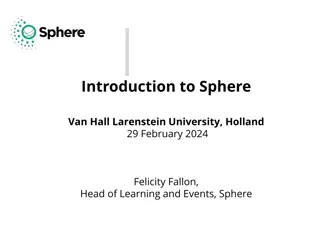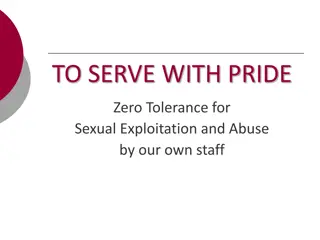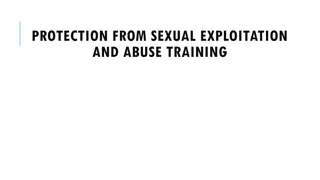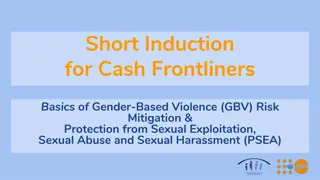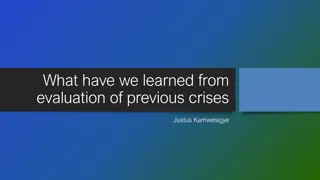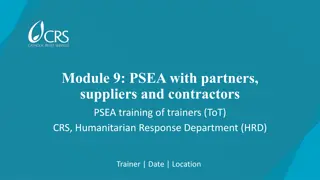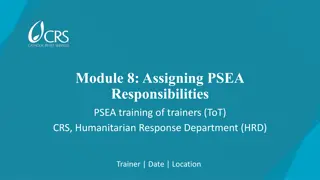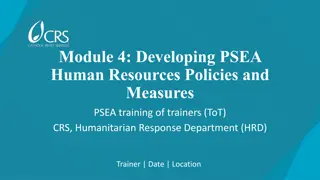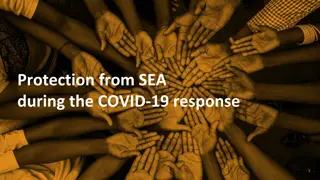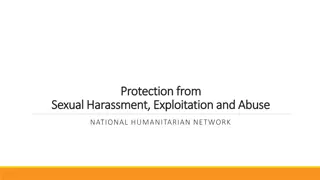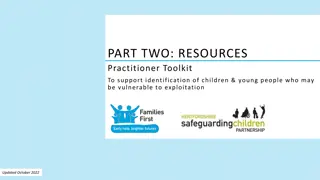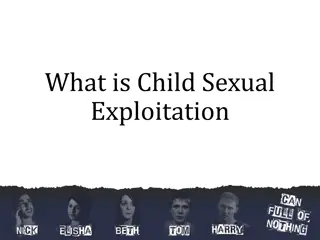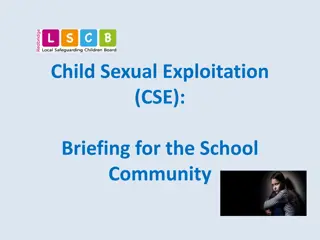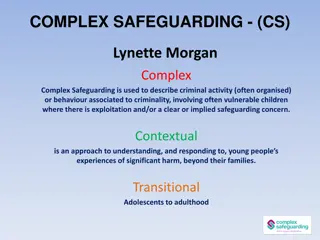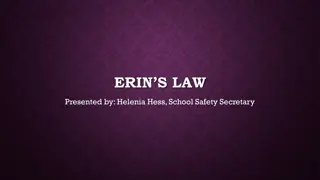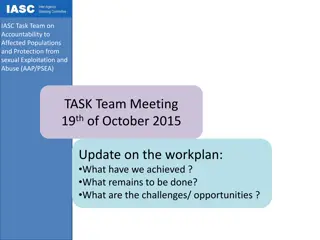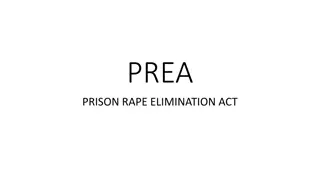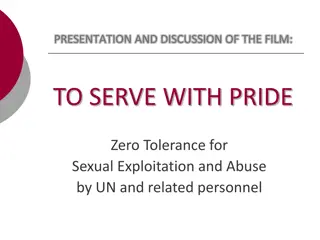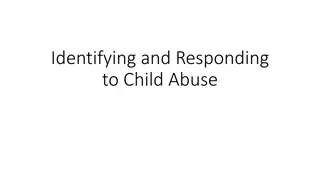Understanding PSEA: Prevention and Response to Sexual Exploitation and Abuse in Humanitarian Settings
Sexual exploitation and abuse in humanitarian settings pose serious threats to vulnerable populations, directly contradicting humanitarian principles. The establishment of initiatives like the Iraq PSEA Network aims to prevent and respond to such misconduct through awareness-raising, capacity building, and community-based complaints mechanisms. Defined as the abuse of power or trust for sexual purposes, efforts are focused on upholding the Secretary-General's Bulletin on Protection from Sexual Exploitation and Abuse to ensure accountability and safeguard the dignity of those affected.
Download Presentation

Please find below an Image/Link to download the presentation.
The content on the website is provided AS IS for your information and personal use only. It may not be sold, licensed, or shared on other websites without obtaining consent from the author. Download presentation by click this link. If you encounter any issues during the download, it is possible that the publisher has removed the file from their server.
E N D
Presentation Transcript
What is PSEA? Protection from Sexual Exploitation and Abuse (PSEA)
1. Define sexual exploitation and abuse and describe and explain (understand) consequences for persons of concern, the seriousness of the problem, and write action plans for what should be done to prevent and respond to it; 2. List, describe, and explain (understand): - the principles of the Secretary-General s Bulletin (SGB) on Special measures for protection from sexual exploitation and sexual abuse (ST/SGB/2003/13) -zero tolerance approach, with focus on: - the prohibition of exchanging money, employment, goods 3. Explain and advise other NGO persons of concern, about the complaints mechanisms and process in their operation, the process of reporting to PSEA Focal Points NGO and partners, as well as
1990-2000 2002 2003 2016
Sexual Exploitation and Abuse by aid workers is a serious problem that directly contradicts the very principles of humanitarian action. In July 2016, the Resident Coordinator/Humanitarian Coordinator established the inter- agency Iraq PSEA Network, co-chaired by the United Nations Population Fund (UNFPA) and World Food Programme (WFP). The Network s main objective is to implement the Secretary- General s Bulletin on Special Measures for Protection from Sexual Exploitation and Sexual Abuse (ST/SGB/2003/13) and to promote further accountability to affected populations. The Iraq PSEA Network promotes awareness raising and capacity building amongst NGOs staff and other humanitarian actors and manages a community-based complaints mechanism for handling SEA cases.
The Iraq PSEA Network Definitions The term sexual exploitation or attempted abuse of a position of vulnerability, differential power, or trust, for sexual purposes, including, but not limited to, profiting monetarily, socially or politically from the sexual exploitation of another The term sexual abuse threatened physical intrusion of a sexual nature, whether by force or under unequal or coercive conditions. The Iraq PSEA Network Definitions sexual exploitation means any actual sexual abuse means the actual or
Gender is directed at an individual based on his or her biological sex OR gender identity. It includes physical, sexual, verbal, emotional, and psychological abuse, threats, coercion, and economic or educational deprivation, whether occurring in public or private life Gender- -based violence based violence (GBV) is violence that
Six Core Principles Relating to Sexual Exploitation and Abuse 1. Sexual exploitation and abuse by humanitarian workers constitute acts of gross misconduct and are therefore grounds for termination of employment. Six Core Principles Relating to Sexual Exploitation and Abuse 2. Sexual activity with children (persons under the age of 18) is prohibited regardless of the age of majority or age of consent locally. Mistaken belief regarding the age of a child is not a defense. 3. Exchange of money, employment, goods, or services for sex, including sexual favours or other forms of humiliating, degrading or exploitative behavior is prohibited. This includes exchange of assistance that is due to beneficiaries.
4. Sexual relationships between humanitarian workers and beneficiaries are strongly discouraged since they are based on inherently unequal power dynamics. Such relationships undermine the credibility and integrity of humanitarian aid work. 5. Where a humanitarian worker develops concerns or suspicions regarding sexual abuse or exploitation by a fellow worker, whether in the same agency or not, he or she must report such concerns via established agency reporting mechanisms. 6. Humanitarian workers are obliged to create and maintain an environment which prevents sexual exploitation and abuse and promotes the implementation of their code of conduct.
Two 2008 studies have pointed out that disaster survivors who have been sexually exploited (or abused) by aid workers often do not complain. Save the Children explains the lack of complaints thus: Children (and adults) are inadequately supported to speak out about abuse against them. The international community does not exercise strong- enough leadership or managerial courage on this issue. There is a lack of investment in child protection by governments and donors.
fear of losing much-needed material assistance. fear of stigmatization. avoid reduction of economic returns threat of retribution or retaliation. lack knowledge on how to report feel powerless to report lack effective legal services a chronic lack of faith cultural barriers
80069999 Iraq-psea@un.org Dr.omer Anh phoung Lotus Flower hotline and focal point Leaders of Iraq network


